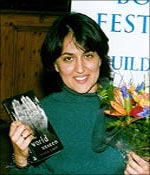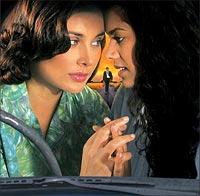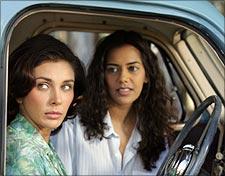|
| Help | |
| You are here: Rediff Home » India » Movies » Report |
|
 Shamin Sharif | ||
| |||||||||||||||||||||||
| Advertisement | |||||||||||||||||||||||
|
| |||||||||||||||||||||||
Last Updated: November 20, 2008 12:55 IST
British Indian filmmaker Shamin Sarif is thrilled. She is about to achieve something that even Clint Eastwood could not.
In the fall of 2006, Eastwood had two films open in theatres in the US -- Letters from Ivo Jima and Flags of Our Fathers. But their opening dates were a couple of months apart. Sarif has two films scheduled to open -- A World Unseen and I Can't Think Straight, in the same month, November.
"It feels amazing because at one point I Can't Think Straight collapsed," Sarif says from the films' publicist office in New York City. "No one was paid and the whole thing got dragged into court. That was two years ago."
While the court action was on, she got a go ahead to shoot A World Unseen in South Africa [Images]. During post production of A World Unseen, the court matter around I Can't Think Straight was settled.
"We finished both the movies simultaneously. Which is why we are looking at an almost simultaneous release," she says.
The coincidence and the connection between the two films do not end there. Both films are lesbian-themed love stories, although they are different in mood and texture -- A World Unseen is set in the world of apartheid in South Africa, and I Can't Think Straight, has a more modern touch, exploring the relationship between two women, one a British Indian and the other an Arab. And if that is not enough, both films star Lisa Ray [Images] (Water) and Sheetal Seth (Looking for Comedy in the Muslim World).

"I couldn't find an Arab actress who would do the love scenes," Sarif says, adding she had a short and low budget casting session in London [Images], with no time or ability to get a casting director to go the Middle East. "So there may well have been Arab actresses who might have agreed. At that point, I had seen Water and I was super-impressed with what Lisa had done. So I sent her the script and she wanted to work on it."
Then Sarif set to look for a British Indian actress and met with the same resistance. None of them wanted to perform love scenes -- even if they were shot tastefully on the screen.
 "The one I had in mind didn't want to do love scenes as she was concerned about her family's response and which is the point of the film really," she adds. "And I thought if that is going to make her uncomfortable, then she is not the right person for the project." A wider net was cast and Sarif discovered Seth in the US.
"The one I had in mind didn't want to do love scenes as she was concerned about her family's response and which is the point of the film really," she adds. "And I thought if that is going to make her uncomfortable, then she is not the right person for the project." A wider net was cast and Sarif discovered Seth in the US.
When it came to casting A World Unseen, Sarif, inspired by Ray's quiet performance in Water once again sought the Canadian Indian actress -- this time to play the role of a repressed wife and a mother. For the second lead Amina -- a boisterous young woman who wears pants and runs a coffee shop with a coloured man as her partner, Sarif searched the pool of actresses again.
"I did look around as I didn't want to feel that I hadn't done my homework," she says. "But in the end, I felt Sheetal brought the right vulnerability and youthfulness to Amina. And I wanted a strong person to perform that role."
We live in a world where prejudice resides across the board and actors often fear being typecast, especially if they are playing against their type in the context of sexuality. Critics have noted that Jake Gyllenhaal will probably never play a gay character again, after his heart wrenching performance in Brokeback Mountain. But according to Sarif, Ray and Seth never expressed any reservations in playing lesbian roles in two back-to-back films.
"They both looked at the films from the perception of love stories and not gay films," Sarif says. "It is na�ve to say that it won't have an impact on their careers, but I think for Lisa it would have been a controversy if she was still in India. But she doesn't want a career in Bollywood. She is very much in the independent sector here now. And they both have a good body of work, many, many films that are non-gay roles."
 Sarif was born in London to parents who were from South Africa. She studied English in London and then at Boston University. And then she took up some film making courses in London.
Sarif was born in London to parents who were from South Africa. She studied English in London and then at Boston University. And then she took up some film making courses in London.
Her family left South Africa in the 1960s to avoid the apartheid policies of the white minority government.Later her parents started visiting South Africa after the apartheid regime was defeated. The Sarif home had a heavy South African influence. English was the first language but her parents also spoke Afrikaans. Even the food her home had South African touch.
"South Africa Indian cooking is slightly different," she says. "It evolved and took on its own identity."
In the film Amina serves cook sisters -- a South African version of a donut with an Indian touch. South African cook sisters are white in colour. Amina's cook sisters -- something Sarif remembers from her grandmother -- are brown in colour, with coconut sprinkled on top.
Up next, for Sarif is a film set in Russia [Images]. And she plans to cast Ray again in the lead role. She also hopes to finish the novel of I Can't Think Straight. And early next year the two films are scheduled to open in UK, Germany [Images] and even India.
| Email | Print | Get latest news on your desktop |
|
|
| © 2008 Rediff.com India Limited. All Rights Reserved. Disclaimer | Feedback |